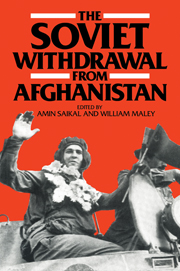Book contents
- Frontmatter
- Contents
- Preface
- 1 Introduction
- 2 The Geneva Accords of April 1988
- 3 Post-Withdrawal Afghanistan: Light at the End of the Tunnel
- 4 The Regional Politics of the Afghan Crisis
- 5 The Afghan Conflict and Soviet Domestic Politics
- 6 The Soviet Armed Forces and the Afghan War
- 7 Afghanistan and Soviet Alliances
- 8 Afghanistan and Sino-Soviet Relations
- 9 The Afghanistan 'Settlement' and the Future of World Politics
- 10 Conclusions: Management of the Afghan Crisis
- List of Contributors
- Index
2 - The Geneva Accords of April 1988
Published online by Cambridge University Press: 09 November 2009
- Frontmatter
- Contents
- Preface
- 1 Introduction
- 2 The Geneva Accords of April 1988
- 3 Post-Withdrawal Afghanistan: Light at the End of the Tunnel
- 4 The Regional Politics of the Afghan Crisis
- 5 The Afghan Conflict and Soviet Domestic Politics
- 6 The Soviet Armed Forces and the Afghan War
- 7 Afghanistan and Soviet Alliances
- 8 Afghanistan and Sino-Soviet Relations
- 9 The Afghanistan 'Settlement' and the Future of World Politics
- 10 Conclusions: Management of the Afghan Crisis
- List of Contributors
- Index
Summary
At a ceremony in the Palais des Nations in Geneva on 14 April 1988, the Government of Pakistan and the Kabul-based regime of the People's Democratic Party of Afghanistan signed a series of Accords dealing with Afghanistan's future. Nearly a decade had passed since non-communist rule had been brought to an end by the violent coup staged by disgruntled supporters of the People's Democratic Party in the Afghan armed forces; and over eight years had elapsed since Soviet forces invaded Afghanistan in December 1979 to replace the erratic President Hafizullah Amin, of the ruling party's Khalq faction, with their trusted ally Babrak Karmal, of the Parcham faction. Much had happened following the invasion. Karmal, a despised and ineffectual figure, had himself been replaced in May 1986 by his Parcham colleague Dr Najibullah, who had headed the regime's secret police (KHAD) from 1980 to 1985.
Yet these petty quarrels were the least of Afghanistan's traumas. The Soviet invasion had met with mass opposition, spearheaded by groups of Islamic resistants (Mujahideen) with bases in Pakistan and Iran; and the technology of modern warfare had been turned directly against the Afghan people, millions of whom fled as refugees to neighbouring countries. The costs of the war were horrendous. According to a Soviet spokesman, by mid-1988, 13310 Soviet soldiers had died in Afghanistan, amply justifying General Secretary Gorbachev's February 1986 description of Afghanistan as a 'bleeding wound' (krovotochashchaia rana).
- Type
- Chapter
- Information
- The Soviet Withdrawal from Afghanistan , pp. 12 - 28Publisher: Cambridge University PressPrint publication year: 1989
- 5
- Cited by



